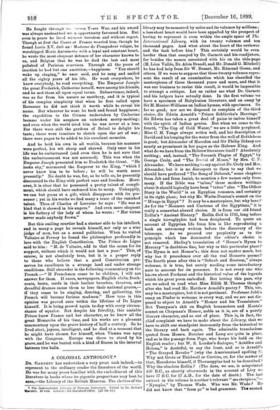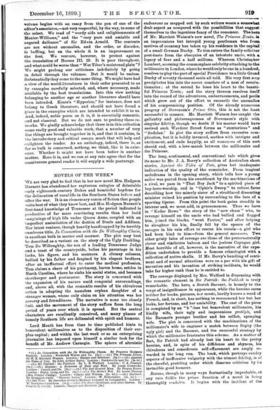A COLOSSAL ANTHOLOGY.* DR. GARNETT has undertaken a very great
task indeed,—to represent to the ordinary reader the literature of the world. He was for many years familiar with the embodiment of this literature in books where its gigantic proportions may best be seen,—the Library of the British Museum. The shelves of the
• The International Library of Famous Literature. Edited Cy Dr. Richard *Arnett. 20 vols. London : the Standard Mee. [£6 168.6d.] library may be measured by miles and its volumes by millions ; a less stout heart would have been appalled by the prospect of having to represent it even within the ample space of 171e International Library, with its twenty volumes and ten, thousand pages. And what about the heart of the reviewer and the task before him ? This certainly would be even harder than that essayed by Dr. Garnett and his coadjutors, for besides the names associated with his on the title-page (M. Leon Vallee, Dr. Alois Brandt, and Mr. Donald G. Mitchell) he has had help from Sir W. Besant, Mr. Edmund Geese, and others. If we were to suppose that these twenty volumes repre- sent the result of an examination which has classified the masterpieces of three thousand years and more, and that it was our business to revise this result, it would be impossible to attempt a critique. Let us rather see what Dr. Garnett and his helpers have actually done. In the first volume we have a specimen of Babylonian literature, and an essay by Sir M. Monier-Williams on Indian hymns, with specimens. So far so good; nor are we disposed to complain of the third choice, Sir Edwin Arnold's "Prince Sidartha's Marriage." Sir Edwin has taken a great deal of pains to imbue himself with the spirit of Indian genius. Bat when we come to the fourth, "The Cup of Cold Water," we are a little perplexed. Miss C. M. Yonge always writes well, and her description of David and his longing for the water from the well of Bethlehem, is good; but Alexander of Macedon and Sir Philip Sidney are nearly as prominent in her pages as the Hebrew King. And what do we have from the Hebrew literature itself ? Absolutely nothing ; and, instead, " The Seventh Plague of Egypt," by George Croly, and " The Bnrial of Moses," by Mrs. C. F. Alexander. We have nothing to say against Dr. Croly and Mrs, Alexander, but it is no disrespect to them to say that we should have preferred "The Song of Deborah," some chapters- from Job and from Isaiah, to mention a few names only from many. If the Bible was "taboo," these modern writings about it should logically have been " taboo " also. " The Oldest Story in the World" is an Egyptian romance, and certainly in its right place; but why Mr. Watts-Dunton's sonnet on the " Mirage in Egypt" ? It may be a masterpiece, but why here ? As for the " Manners and Customs of the Egyptians," it is really a somewhat absurd choice. It is from our old friend Rollin's " Ancient History." Rollin died in 1741, long before a single hieroglyphic had been deciphered. To quote an account of Egyptian life from him is like reproducing a. book on astronomy written before the discovery of the telescope. As we proceed our perplexity as to the principle which has dominated the editor's choice is not removed. Shelley's translation of " Homer's Hymn to Mercury" is doubtless fine, but why in this particular place ? The Hymn is not Homer's ; this does not matter much, but why has it precedence over all the real Homeric poems? The fourth piece after this is " Sohrab and Rustum," always welcome, it is true, but surely needing some introductory note to account for its presence. It is not every one who• knows about Ferdausi and the historical value of the legends which his great poem embodied. But letting this pass, why are we asked to read what Miss Edith M. Thomas thought after she had read Mr. Matthew Arnold's poetry ? This, too, may be a masterpiece, but it is not pertinent. Professor Jebb's essay on Pinder is welcome is every way, and we are not dis- posed to object to Arnold's "Homer and his Translators." But Tennyson's skit on English hexameters and Keats's sonnet on Chapman's Homer, noble as it is, are of a purely- literary character, and so out of place. This is, in fact, the chief complaint we have to make about the Library, that we have to shift our standpoint incessantly from the historical to the literary and back again. The admirable translations quoted from Messrs. Butcher and Lang are quite in place, and so is the passage from Pope, who keeps his hold on the- English reader ; but W. S. Landor's dialogue, "Achilles and Helena," is doubtful, to say the least, and so is Arnold's " The Strayed Reveler" (why the Americanised spelling ?). Why not Grote or Thirlwall or Curtins, or, for the matter of that, Herodotue himself, if Thermopylae had to be described ? Why the obsolete Rollin ? (The date, we see, is misprinted 430 B.C., as shortly afterwards in the account of Livy we have 17 B.C. for 17 A.D., for the date of death.) The last extract in the volume is another irrelevant " ma sterpiece,"— " Nymphs," by Thomas Wade. Who was Mr. Wade ? He did not know that "from ye" is bad grammar. no second volume begins with an essay from the pen of one of the editor's associates,—not very respectful, by the way, to some of the select. We read of "wordy aids and enlightenments of Monier-Williams," and the " easy pace and amiable and =sugared dalliance" of Sir Edwin Arnold. The contents are not without anomalies, and the order, or disorder, is baffling, but on the whole it is an improvement on the first. We venture, however, to protest against the translation of Horace IIL 29. It is poor throughout, and what could be worse than " Wet Tibur's moistened plain "P We might prolong our criticisms indefinitely by going in detail through the volumes. But it would be useless. Substantially they come to the same thing. We might have had a view of the world-literatures in their order presented to us by examples carefully selected, and, where necessary, made available by the best translations. Into this view nothing belonging to another age or another literature should have been intruded. Keats's " Hyperion," for instance, does not belong to Greek literature, and should not have found a .place in the examples which are intended to exhibit it to us. And, indeed, noble poem as it is, it is essentially romantic, nand not classical. But we do not care to prolong these re- marks. We gladly acknowledge that there is in this collection some really good and valuable work, that a number of very fine things are brought together in it, and that it contains, in the introductory and critical essays, much that will help and enlighten the reader. As an anthology, indeed, there is, as far as bulk is concerned, nothing, we think, like it in exist- ence. Whether it might not have been better is another caaatter. Here it is, and we can at any rate agree that for the omnivorous general reader it will supply a wide pasturage.











































 Previous page
Previous page